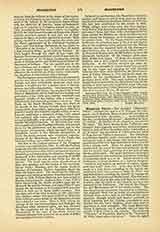

Malone, WILLIAM, Jesuit missioner and writer; b., according to the best authorities, in 1585; d. at Seville, 1655. His father, Simon Malone, was a Dublin merchant, and his mother was Margaret Bexwick, a native of Manchester. William entered the Society of Jesus at Rome in 1606, and, after studying there and in Portugal, was sent as a missioner to Ireland in 1615. In 1635 he was summoned to Rome, where he was made rector of the Irish College, a post which he held for many years. He was again sent to Ireland in 1647 as superior of the Irish Mission of the Society. His term of office fell in most difficult times. In a letter dated from Waterford, March 15, 1649, he says that the burden was heavier on his shoulders than Mount Etna, so that he could say with the Apostle that he was weary even of life. He was at Waterford when the town was taken by the Parliamentarians, and being captured he was banished. On reaching Seville his talents for government were again utilized, and he was made rector of the Jesuit College of St. Gregory in that city. Dr. Oliver says of Malone that during nearly a quarter of a century he rendered good service to the Irish Mission by his splendid talents, apostolic zeal, and extraordinary prudence. Dodd, in his “Church History of England“, testifies that “he was a person of learning and conduct, and well esteemed not only by those of his own order, but by all others that had any knowledge of him”.
As a writer he is well known from his controversy with Ussher, the famous Protestant Archbishop of Armagh. Malone himself tells us how the controversy arose. At the request of his friend, Sir Piers Crosby, not long after Malone had come to Ireland in 1615, he wrote a “Demand concerning the alteration of Faith and Religion in the Roman Church.” Although both Dodd and Sommervogel put this paper down as one of his “Works”, it was in reality nothing more than a thesis, proposition, or brief statement of the Catholic position in the religious controversy. It was hurriedly drawn up by Malone at the request of his Protestant friend, who said that he was convinced that it could be answered by Ussher, then Dean of Finglas. The thesis was printed both by Ussher, in his “Answer to a Challenge made by a Jesuit in Ireland“, published in London, 1625, and also by Malone himself in his “Reply to Mr. James Ussher his Answere, wherein it is discovered how Answerlesse the said Mr. Ussher returneth. The uniform consent also of Antiquity is declared to stande for the Roman Religion: and the Answerer is convinced of vanity in challenging the Patronage of the Doctors of the Primitive Church for his Protestancy.” Apparently this book was printed at Douai in 1627, and was dedicated to Charles I, King of England, in an “Epistle Dedicatory” which breathes a spirit of ardent patriotism and loyalty. The author protests against his thesis being called a “Challenge” by Ussher. It was nothing more than a brief statement of the well-known argument from prescription, and it was answered neither by Dr. Synge, nor by Dr. Hoyle, nor by Puttock, a Protestant minister at Navan, although all of them wrote against the book. It is the only work written by Malone, and has never been reprinted.
T. SLATER

